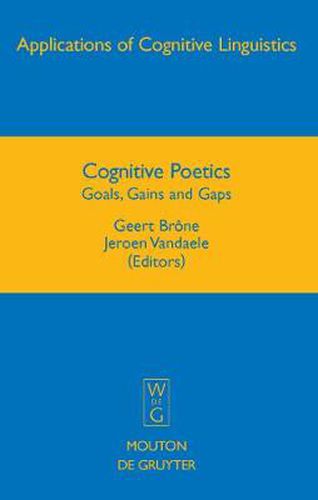Readings Newsletter
Become a Readings Member to make your shopping experience even easier.
Sign in or sign up for free!
You’re not far away from qualifying for FREE standard shipping within Australia
You’ve qualified for FREE standard shipping within Australia
The cart is loading…






This title is printed to order. This book may have been self-published. If so, we cannot guarantee the quality of the content. In the main most books will have gone through the editing process however some may not. We therefore suggest that you be aware of this before ordering this book. If in doubt check either the author or publisher’s details as we are unable to accept any returns unless they are faulty. Please contact us if you have any questions.
For more than two decades now, cognitive science has been making overtures to literature and literary studies. Only recently, however, cognitive linguistics and poetics seem to be moving towards a more serious and reciprocal type of interdisciplinarity. In coupling cognitive linguistics and poetics, cognitive poeticians aim to offer cognitive readings of literary texts and formulate specific hypotheses concerning the relationship between aesthetic meaning effects and patterns in the cognitive construal and processing of literary texts. One of the basic assumptions of the endeavour is that some of the key topics in poetics (such as the construction of text worlds, characterization, narrative perspective, distancing discourse, etc.) may be fruitfully approached by applying cognitive linguistic concepts and insights (such as embodied cognition, metaphor, mental spaces, iconicity, construction grammar, figure/ground alignment, etc.), in an attempt to support, enrich or adjust ‘traditional’ poetic analysis. Conversely, the tradition of poetics may support, frame or call into question insights form cognitive linguistics.
In order to capture the goals, gains and gaps of this rapidly growing interdisciplinary field of research, this volume brings together some of the key players and critics of cognitive poetics. The eleven chapters are grouped into four major sections, each dealing with central concerns of the field: (i) the cognitive mechanisms, discursive means and mental products related to narrativity (Semino, Herman, Culpeper); (ii) the different incarnations of the concept of figure in cognitive poetics (Freeman, Steen, Tsur); (iii) the procedures that are meant to express or create discursive attitudes, like humour, irony or distance in general (Antonopoulou and Nikiforidou, Dancygier and Vandelanotte, Giora et al.); and (iv) a critical assessment of the current state of affairs in cognitive poetics, and more specifically the incorporation of insights from cognitive linguistics as only one of the contributing fields in the interdisciplinary conglomerate of cognitive science (Louwerse and Van Peer, Sternberg).The ensuing dialogue between cognitive and literary partners, as well as between advocates and opponents, is promoted through the use of short response articles included after ten chapters of the volume.
Geert Brone, Katholieke Universiteit Leuven, Belgium; Jeroen Vandaele, University of Oslo, Norway.
$9.00 standard shipping within Australia
FREE standard shipping within Australia for orders over $100.00
Express & International shipping calculated at checkout
This title is printed to order. This book may have been self-published. If so, we cannot guarantee the quality of the content. In the main most books will have gone through the editing process however some may not. We therefore suggest that you be aware of this before ordering this book. If in doubt check either the author or publisher’s details as we are unable to accept any returns unless they are faulty. Please contact us if you have any questions.
For more than two decades now, cognitive science has been making overtures to literature and literary studies. Only recently, however, cognitive linguistics and poetics seem to be moving towards a more serious and reciprocal type of interdisciplinarity. In coupling cognitive linguistics and poetics, cognitive poeticians aim to offer cognitive readings of literary texts and formulate specific hypotheses concerning the relationship between aesthetic meaning effects and patterns in the cognitive construal and processing of literary texts. One of the basic assumptions of the endeavour is that some of the key topics in poetics (such as the construction of text worlds, characterization, narrative perspective, distancing discourse, etc.) may be fruitfully approached by applying cognitive linguistic concepts and insights (such as embodied cognition, metaphor, mental spaces, iconicity, construction grammar, figure/ground alignment, etc.), in an attempt to support, enrich or adjust ‘traditional’ poetic analysis. Conversely, the tradition of poetics may support, frame or call into question insights form cognitive linguistics.
In order to capture the goals, gains and gaps of this rapidly growing interdisciplinary field of research, this volume brings together some of the key players and critics of cognitive poetics. The eleven chapters are grouped into four major sections, each dealing with central concerns of the field: (i) the cognitive mechanisms, discursive means and mental products related to narrativity (Semino, Herman, Culpeper); (ii) the different incarnations of the concept of figure in cognitive poetics (Freeman, Steen, Tsur); (iii) the procedures that are meant to express or create discursive attitudes, like humour, irony or distance in general (Antonopoulou and Nikiforidou, Dancygier and Vandelanotte, Giora et al.); and (iv) a critical assessment of the current state of affairs in cognitive poetics, and more specifically the incorporation of insights from cognitive linguistics as only one of the contributing fields in the interdisciplinary conglomerate of cognitive science (Louwerse and Van Peer, Sternberg).The ensuing dialogue between cognitive and literary partners, as well as between advocates and opponents, is promoted through the use of short response articles included after ten chapters of the volume.
Geert Brone, Katholieke Universiteit Leuven, Belgium; Jeroen Vandaele, University of Oslo, Norway.